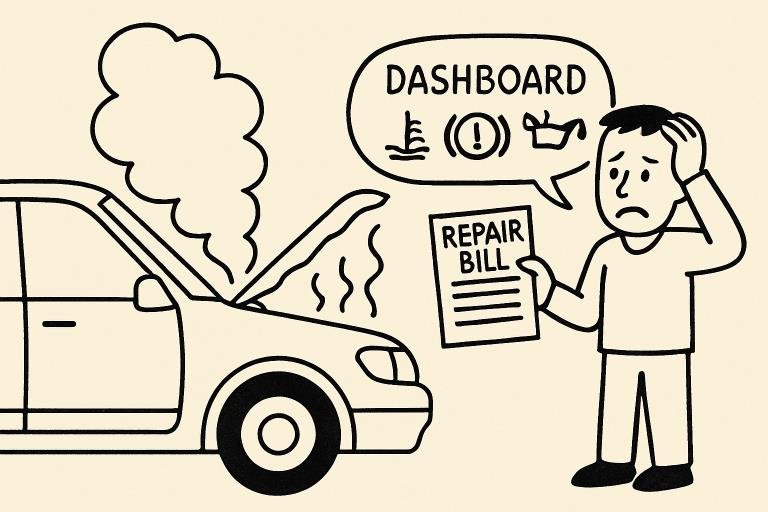Key Takeaways
- Engine and transmission complaints are among the top reasons drivers file Lemon Law claims. These systems are critical for the car’s performance and safety, turning small defects into major liabilities if left unresolved.
- Problems with electrical systems and brakes can compromise safety and reliability. Modern cars depend on complex electronics, so when these fail, the car can quickly become undrivable or dangerous.
- Defects in steering, suspension, and fuel systems also commonly result in Lemon Law proceedings. Issues in these vital areas can lead to dangerous driving conditions and are often more difficult to permanently resolve.
- Thorough documentation of all repair attempts and a clear understanding of your legal rights are crucial for a successful Lemon Law claim. Keeping receipts, service records, and written correspondence can make or break your case.
Buying a new car should be a smooth, rewarding experience. Still, for some consumers, it quickly turns into the frustrating reality of recurring mechanical failures and a seemingly endless cycle of dealership visits. The anticipation of enjoying a reliable, comfortable ride is replaced by growing anxiety over constant problems and unexpected repair bills. Recognizing the specific types of defects that most frequently result in Lemon Law claims is crucial to protecting yourself as a car owner. By learning to identify these issues early, you can take swift action and avoid being saddled with a vehicle that is more of a headache than an asset. Especially in states like Florida, where robust Lemon Laws exist, having an understanding of your consumer rights can make a significant difference in the outcome of your situation. To better understand the resources and processes available to you, see detailed information regarding the Lemon Law Florida used car.
For those facing repeated, unsuccessful repairs or encountering serious safety hazards, there are well-defined legal pathways designed to protect your substantial financial investment in your vehicle. From engines that refuse to start reliably to brake systems that develop unpredictable failures, certain persistent problems clearly qualify a car for Lemon Law relief. This legal protection is triggered especially when manufacturers or authorized dealers fail to provide lasting repairs within a reasonable time or number of attempts. Knowing what defects count—and ensuring your attempts for resolution are properly documented—will give you a solid foundation for a potential Lemon Law claim and help you stop wasting your time and money on a chronically unreliable car.
Engine Problems
The engine is considered the heart of every vehicle, and without a properly functioning engine, your car is both unreliable and unsafe. Persistent engine defects rank among the leading causes of Lemon Law claims across the United States. Owners of problematic vehicles often report a wide range of distressing symptoms, including:
- Frequent stalling while idling or driving, making the car unsafe in busy intersections or on highways
- Sudden loss of power during acceleration, which can rapidly turn everyday maneuvers such as merging or passing into dangerous situations
- Unexplained excessive oil consumption, often resulting in repeated low oil warnings and causing lasting damage if not constantly monitored
- Frequent or unexplained overheating puts your engine at risk of catastrophic failure.
Engine issues often result in downtime, expensive repairs, and, above all, safety risks. According to Consumer Reports, ongoing engine problems can persist even after multiple dealership visits, with some vehicles requiring major repairs or complete engine replacements. When manufacturers fail to resolve these significant problems efficiently, affected vehicles quickly become strong candidates for Lemon Law cases. Persisting with a defective engine isn’t just inconvenient—it can directly threaten your safety.
Transmission Failures
Transmission systems are responsible for transferring power from the engine to the wheels, enabling your car to move smoothly and efficiently. Transmission defects are another common reason for Lemon Law complaints. These issues often manifest as:
- Slipping gears or grinding sounds, particularly during acceleration or shifting
- Delayed or unpredictable acceleration, which can catch drivers off guard and cause unpredictable driving experiences
- Sudden jerking, especially when shifting between gears, can lead to discomfort and potential long-term damage
- Total loss of movement, leaving drivers stranded and powerless to control the vehicle’s motion
Transmission failures pose significant safety risks, particularly during maneuvers that require precise timing and control, such as merging onto highways or navigating busy intersections. In recent years, several popular model lines have faced widespread recalls because of persistent transmission defects. When repeated repairs fail to restore reliability, these problems frequently lead to successful Lemon Law claims.
Electrical System Malfunctions
As automotive technology continues to advance, modern vehicles have become more reliant on intricate electrical systems and onboard computers than ever before. This increased complexity, while improving features and convenience, has also contributed to a growing number of Lemon Law claims related to electrical failures, such as:
- Malfunctioning infotainment screens or navigation systems, sometimes rendering essential controls unusable
- Short-circuiting sensors that lead to false alarms, warning lights, or unpredictable driving dynamics
- Backup cameras that fail or glitch unpredictably, undermining visibility and safety during parking maneuvers
Electrical issues can be especially frustrating because they are often intermittent and difficult to diagnose. Problems such as failed software updates, battery drainage, and unpredictable system resets may leave your car undrivable or unreliable. In some cases, owners experience total electrical failure, rendering essential features—such as ignition or braking—completely inoperable. Sophisticated vehicles that rely heavily on wireless updates and multiple sensors are especially prone to these types of unresolved electrical problems. Lemon Law protections often become necessary for relief if repeated service visits are met only with temporary fixes or new glitches.
Brake System Malfunctions
The brake system is perhaps the most critical safety feature of any vehicle, so brake failures are understandably distressing and serious. Common defects cited in Lemon Law claims involving brakes include:
- Premature wear of pads, rotors, or calipers, resulting in grinding noises or reduced stopping power, can escalate rapidly.
- Warning lights signaling anti-lock braking system (ABS) or electronic brake problems, disrupting confidence in emergency braking situations
- Software glitches affecting adaptive braking or automatic braking assist functions, which now play major roles in vehicle safety
When a vehicle’s braking system fails repeatedly or frequently triggers safety warnings, the risks of accidents and injuries increase exponentially. Some manufacturers have identified and recalled vehicles with flawed electronic brake controls, which can cause intermittent or complete loss of braking power. In such situations, many owners are encouraged to pursue Lemon Law protections to remedy faulty brake systems that can put both the driver and others on the road at immediate risk.
Steering and Suspension Issues
Steering and suspension systems are essential for keeping your vehicle stable, comfortable, and responsive. Problems with these components can quickly render a vehicle unsafe. Car owners may notice symptoms such as:
- Steering pulls sharply to one side, making straight driving challenging and increasing the potential for accidents
- Loose or unresponsive steering wheels can reduce the driver’s sense of control
- Unusual vibrations or noises from the suspension indicate possible damage or malfunction of critical parts
Persistent steering issues frequently result from power steering or rack-and-pinion failures—problems that may come back even after attempted repairs. These types of defects are especially dangerous, as they directly affect your ability to control your vehicle in everyday driving as well as during emergencies. Lemon Laws strongly protect drivers facing these problems, allowing them to seek legal remedies if repairs aren’t effective after reasonable attempts.
Fuel System Problems
A faulty fuel system is a significant safety and environmental concern, with the potential to cause fires, breakdowns, or hazardous leaks. Common fuel system issues involve:
- Unexpected fuel leaks or persistent smells of gasoline, which can suggest cracked hoses or failed seals
- Rough idling, frequent stalling, or a no-start condition, leaving drivers stranded when reliability is crucial
- Sudden loss of power while driving, increasing risk in heavy traffic or on highways
Fuel system problems may start small but can quickly become life-threatening, especially if leaks develop near hot engine components or electrical wiring. In some cases, fuel delivery issues lead to unpredictable loss of power, making normal driving dangerous. If repeated repair visits fail to address these severe safety risks, the Lemon Law provides a valuable option for vehicle replacement or refund.
Conclusion
It’s essential for car owners to stay vigilant about common defects, diligently document every repair attempt, and promptly consult a Lemon Law professional when their car remains unreliable after repeated service visits. In many cases, persistent mechanical or electrical issues may qualify a vehicle as a lemon, triggering state or federal consumer protections designed to protect your financial investment and personal safety. If ongoing vehicle problems threaten your peace of mind and safety, act quickly—assert your rights and safeguard your investment by getting professional legal advice as soon as recurring failures arise.



